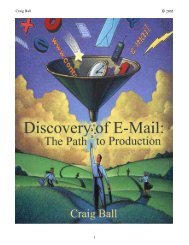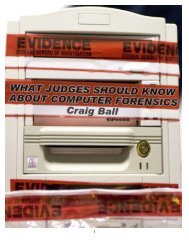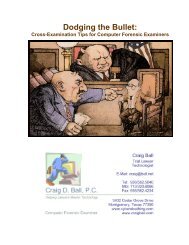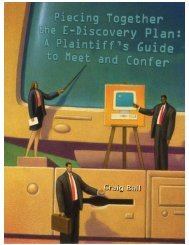Five on Forensics Page 1 - Craig Ball
Five on Forensics Page 1 - Craig Ball
Five on Forensics Page 1 - Craig Ball
Create successful ePaper yourself
Turn your PDF publications into a flip-book with our unique Google optimized e-Paper software.
<str<strong>on</strong>g>Five</str<strong>on</strong>g> <strong>on</strong> <strong>Forensics</strong><br />
© 2002-2008 <strong>Craig</strong> <strong>Ball</strong> All Rights Reserved<br />
The Server Tape C<strong>on</strong>undrum<br />
According to the market research firm Osterman Research, 67 percent of companies back up<br />
their e-mail systems to tape al<strong>on</strong>e and recycle the tapes every 90 days. Suppose you know<br />
that your client’s server data are backed up to tape and that those tapes tend to be re-used in<br />
a way that overwrites old data with new. When the time comes to swing into acti<strong>on</strong> and<br />
preserve potentially discoverable evidence, how are you going to deal with your client’s tape<br />
rotati<strong>on</strong>? The easy answer is, “I’ll instruct them to stop re-using tapes until further notice.”<br />
That’s certainly not a wr<strong>on</strong>g answer from the standpoint of protecting your client from claims<br />
of spoliati<strong>on</strong> and even from the Delete-O-Th<strong>on</strong> initiatives of their own employees, but it’s not<br />
always a practical or tactically sound <strong>on</strong>e. It’s the right answer according to 7 Moore’s<br />
Federal Practice, which states that, “The routine recycling of magnetic tapes that may c<strong>on</strong>tain<br />
relevant evidence should be immediately halted <strong>on</strong> commencement of litigati<strong>on</strong>.” §<br />
37A.12[5][e] (Matthew Bender 3d ed). But, it is not the <strong>on</strong>ly right answer, nor is it necessarily<br />
the right answer from beginning to end of the litigati<strong>on</strong>.<br />
Many companies are always embroiled in some phase of litigati<strong>on</strong>, so an instructi<strong>on</strong> to cease<br />
back up rotati<strong>on</strong> during the pendency of a case is tantamount to saying, “Save everything<br />
forever.” Back up tapes are expensive. Properly storing back up tapes is expensive.<br />
Hanging <strong>on</strong> to the obsolete hardware needed to read back up tapes from last year or the year<br />
before that is expensive. There are specialists who make a handsome living curating<br />
“Museums of Old Backup Tape Drives” because no <strong>on</strong>e thought to hang <strong>on</strong>to those tape<br />
drives from 1995 or the software than ran them. Even when the case from 2004 is finally<br />
over, do you have to retain the tapes because of the case filed last m<strong>on</strong>th?<br />
What you advise your client to do and for how l<strong>on</strong>g should be based in part up<strong>on</strong> how they<br />
use their back up system. Companies tend to fall into two camps: those that use their back<br />
up systems as a means to recover from catastrophe—to get their systems “back up” and<br />
running again—and those that use back up as a means of instituti<strong>on</strong> memory--an archives of<br />
company activities extending bey<strong>on</strong>d the minimum required to restore to the point of failure.<br />
If your client falls in the latter camp, they almost certainly do need to halt their tape rotati<strong>on</strong>,<br />
since their usage is archival of business records and the start of litigati<strong>on</strong> is an inauspicious<br />
time to start destroying business records, at least until you can fully ascertain the relevant<br />
scope of the matters in dispute. But if your client falls in the first camp and just uses back up<br />
to get back up, doesn’t maintain an archive of old tapes and keeps the focus solely <strong>on</strong><br />
catastrophic recovery, you may be fully justified in not halting back up tape rotati<strong>on</strong>, assuming<br />
that you have taken other appropriate steps to preserve potentially relevant and discoverable<br />
data. Keep in mind that, absent a catastrophic failure, the most recent back up set is<br />
essentially a mirror image of the live system data, so restoring and searching the latest back<br />
up is usually of little value.<br />
Before you decide in which camp your client falls, you’ll need to do more than just ask the<br />
V.P. of IT whether there is a tape archive. You need to pose your questi<strong>on</strong>s as well to the<br />
pers<strong>on</strong> whose job it is to shove those tapes into the machine and keep track of them. The<br />
reality is that the manager may not always know what the technicians are doing “in the pits.”<br />
<strong>Page</strong> 71













